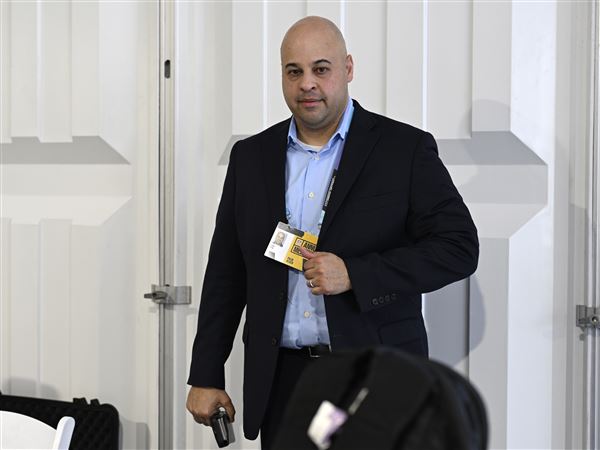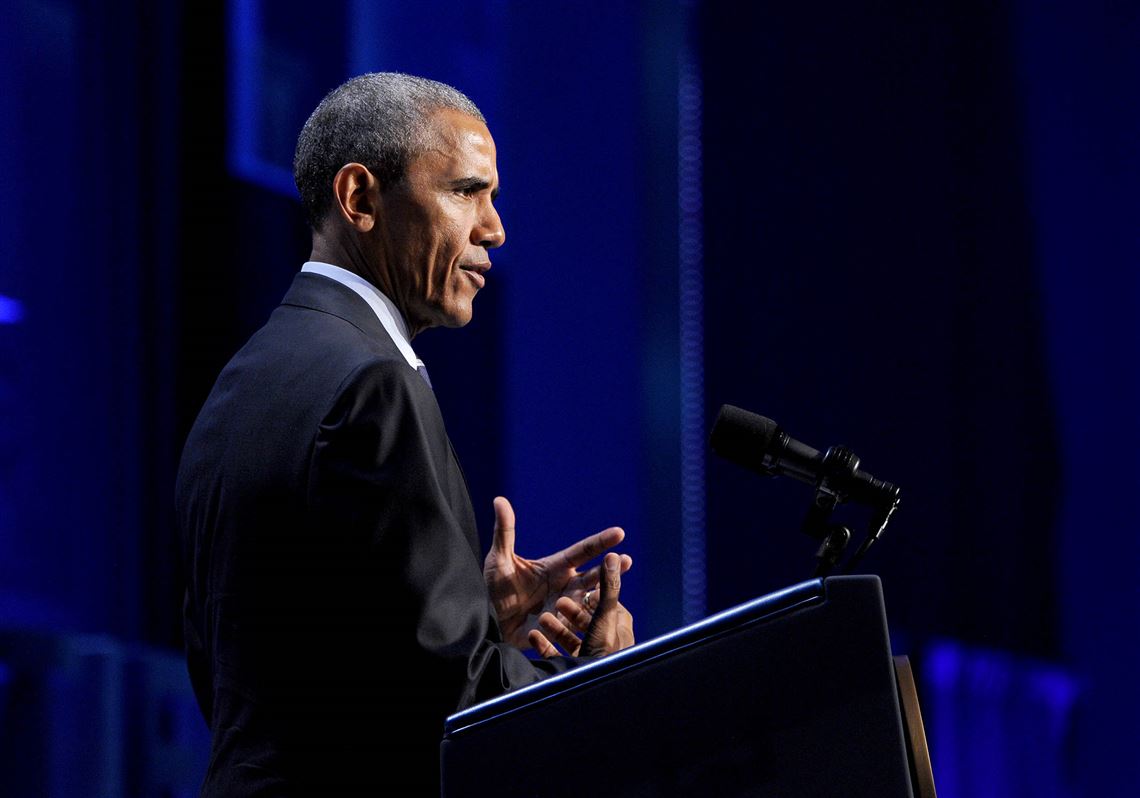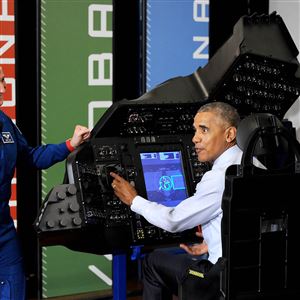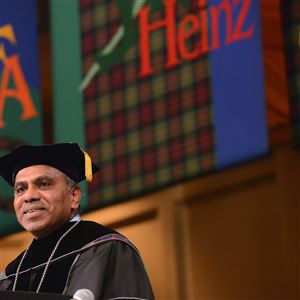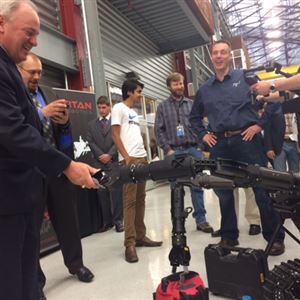President Barack Obama made a confession Thursday at Carnegie Mellon University.
"I am a science geek. I am a nerd," he said in a speech before more than 700 people. "And I don't make any apologies for it. It's cool stuff."
The assertion was widely applauded at an event that marked the capstone of the White House Frontiers Conference, held at CMU and the University of Pittsburgh. And Mr. Obama spent much of Thursday afternoon demonstrating his geek credentials -- though before he flew back to the White House, he voiced concern that scientific progress also presented social challenges.
After arriving on Air Force One just after 1:15 p.m. Mr. Obama spent an hour viewing exhibits of cutting-edge technology at both universities, joined by Pitt Chancellor Patrick Gallagher and CMU President Subra Suresh. He climbed into a simulator that allowed him to dock a shuttle at the International Space Station, and when docking was complete, proclaimed, "Your ride is here, baby!" He thudded the skin of a SpaceX Dragon 2 spacecraft, and called out, “It’s like a surfboard!” Minutes later he asked, “You almost want to get in and take off, don’t you?”
Mr. Obama even took a few minutes out of his visit for fun: Before flying back to Washington, he taped a skit with Stephen Colbert of "The Late Show," slated to air Monday.
But Mr. Obama appeared most impressed by a system in which brain implants allow a person with nerve damage not just to manipulate a prosthetic arm but to feel sensations through it. The University of Pittsburgh unveiled the technology Thursday with a demonstration involving Nathan Copeland, who has been paralyzed since a 2004 car accident. Mr. Obama shook hands and laughingly executed a fist-bump with Mr. Copeland, afterward telling researchers, “I’m really proud of you.”
Mr. Obama said, Mr. Copland "can move that arm, the same way you and I do: just by thinking about it. But that's just the beginning. Nathan is also the first person in human history who can feel with his prosthetic fingers. ... He hasn't been able to use his arms or legs for well over a decade, but now he can once again feel the touch of another person."
The speech was at times elegiac for Mr. Obama, who is in the final months of his term. He cited some of his administration's own scientific initiatives but noted, "I only get two terms, which is fine. Because the presidency is a relay race. We run our leg, then we hand off the baton."
He also took a few pokes at the Republicans who had dogged his adminstration, acknowledging that, "It's not just that they're saying climate change is a hoax, or throwing a snowball on the Senate floor to prove that he climate's not getting warmer. It's that they are doing everything they can to gut funding for research and development."
"Sixty years ago when the Russians beat us into space, we didn't deny that Sputnik was up there," he added. "That wouldn't have worked. No! We acknowledged the facts and then we built a space program almost overnight and beat them to the moon. And we kept going."
Later, in a panel discussion with top researchers led by popular science writer Atul Gawande, Mr. Obama expanded on that point, noting that there were perils to technology.
While the Internet "is bringing us unprecedented knowledge," he said, "Everything on the internet looks like it might be true. And so in this political season we've seen — you just say stuff. And so everything suddenly just contested. That I do not think is good for our democracy. And it's certainly not good for science, or progress or government."
And technology, he admitted, could worsen the social anxieties that were also part of this year's political climate — especially for the working class.
"Any scientific revolution is by definition contesting the status quo," he said. And referring to autonomous vehicles being researched in Pittsburgh, he said, "If self-driving cars are going to be pervasive, a huge percentage of the Ameican population makes its living, and oftentimes a pretty good living, driving. So understandably, people are going to be concerned about what does this mean?"
He closed with an appeal to the audience, urging it to realize that "government will never run the way Silicon Valley runs. Because by definition democracy is messy. This is a big, diverse country, with a lot of interests, and a lot of disparate points of view."
And if scientists didn't engage in that process and "tolerate not perfect outcomes, but better outcomes," he warned, "the space to continue scientific progress isn't going to be there. "
4:30 p.m.

President Obama speaks this afternoon at the White House Frontiers Conference at Carnegie Mellon University. (Michael Henninger/Post-Gazette)
4 p.m.
"I'm a science geek. I'm a nerd, and I don't make any apologies for it." —@POTUS #WHFrontiers https://t.co/pxdVwLATrD
— The White House (@WhiteHouse) October 13, 2016
3:30 p.m.

Pittsburgh Mayor Bill Peduto, center, Allegheny County Executive Rich Fitzgerald and Gov. Tom Wolf greet President Obama this afternoon. (Michael Henninger/Post-Gazette)
Pittsburgh Mayor Bill Peduto – who was later described by the the U.S. government’s chief technology officer Megan Smith as “the incredible Mayor Peduto - gave a standing-room-only audience of about 120 people a history lesson Thursday morning.
As the keynote speaker for the “Local” frontier track held at Carnegie Mellon University, Mr. Peduto tried to explain that Pittsburgh’s history jumps from a frontier town, to booming steel town, to dying steel town, and now to an eds-and-meds economy, really is not so hard to understand.
“It’s a history of innovation,” he told the audience.
“And Pittsburgh’s [most recent] overnight success story is the result of 30 years of hard work and innovation” since the steel mills left town, he said.
During that history lesson, he also gave an alternate view of history that had the crowd laughing.
He pointed out that if Henry Clay Frick and Andrew Carnegie – the two men who built the largest steel company in the world in Pittsburgh in the 1800s – had been better friends, “I have no doubt that this great institution would [instead] be called Carnegie Frick and Mellon.”
He made sure to say the name quickly so it sounded more like: “Carnegie Frick’n Mellon.”
--
On a panel to talk about the future of urban transportation in the “Local” frontier, the four participants – including Mr. Peduto - came from distinctly different perspectives, but arrived at a similar vision of a future where how we get around involves getting all of us out of our personal cars and into either shared individual vehicles or ride sharing vehicles, all of them autonomous.
The reason for that as a future goal, said Robin Chase, the co-founder of Zipcar, is because: “One person in 120 square feet [inside a car of their own] is the bane of cities.”
With everyone in shared, autonomous vehicles that are used by everyone, “There is no place I can’t go because I can go everywhere safely and cheaply” in such a future, she said.
That is the vision the federal government has been pursuing, too, said Anthony Foxx, the secretary of the U.S. Department of Transportation.
He said the $350 million that the federal government has awarded in grants over the last year alone in transportation innovation is aimed at making the improvements “so ubiquitous that the person who is poor has access to [the result of the improvements] in the same way a person who is rich does.”
Tim Kentley-Klay, the CEO of Zook, an autonomous car company based in Palo Alto, said his hope is that the people will have “A vehicle which is smart enough to understand its environment but also smart enough to understand you.”
But Mr. Peduto pointed out that even as the possibility to move forward on autonomous vehicles is looming – particularly in Pittsburgh where Uber is widely testing such technology – there remains caution.
“Government is risk averse,” he said, and there are many historical precedents for the point we are at.
“When we started in aviation… there wasn’t a guarantee that there wouldn’t be times when it would fail,” he said, and now that same fear looms with autonomous vehicles with the public and government that has to be overcome.
--
During a “lightning” panel – where speakers had only about three minutes to talk about the work they are doing with their research or companies - Antwi Akom, CEO of Streetwyze, pointed out how misrepresentative much of big data can be and how people can refine it – a process he calls “groundtruthing.”
His company, based in San Francisco, created a neighborhood navigating app sourced by local knowledge.
Using a map of East Oakland, he showed how existing government data on where “grocery stores” were located, made it appear that the poor community in East Oakland “look like a veritable food oasis” with dozens of small yellow dots.
But when Streetwyze used its app to identify what those dots actually represented, it found that “only a handful are really grocery stores” and the rest were liquor stores or corner stores without much of food choices.
--
Justin Hall, another “lightning” panel member on the Local track, explained how a simple idea – “Could we teach former coal miners to [do computer] code” – grew into his company, Bitsource over the last two years.
Starting with advertisements in just three coal counties in eastern Kentucky, the company got 950 applications for just 10 positions in the startup.
But after one of the former miners withdrew immediately because he felt he could not do it, “That’s when we realized this wasn’t just a knowledge transfer problem.”
But working through such issues has turned into a success, and the company now has 14 projects under development – projects where the former coal miners have written code for computer projects, including the company’s first repeat business from a Fortune 500 company.
“We have exported coal for years from the heart of Appalachia,” he said. “Now we want to export code.”
— Sean D. Hamill
2:30 p.m.

President Obama steps from Air Force One after it arrived in Pittsburgh this afternoon. (Nate Guidry/Post-Gazette)
1:15 p.m.
When will Americans begin the mission to Mars? The response at the Frontiers Conference this morning at CMU was "We already have."
More than 100 people -- self-described "space geeks" -- gathered in CMU's Cohon University Center for the "Interplanetary" discussion led by leaders of NASA and the nation's commercial space industry. President Barack Obama initiated the daylong conversation on space and other topics at CMU and the University of Pittsburgh.
The interplanetary session was begun with welcoming remarks from Rod Roddenberry, the son of the late Gene Roddenberry, creator of "Star Trek."
"I'm incredibly humbled to be surrounded by some of our greatest scientific and engineering minds," said Mr. Roddenberry, CEO of Roddenberry Entertainment. "I have a background in science, but not in reality. I grew up with science fiction."
But as Mr. Roddenberry and other speakers said, so much of the technological achievements of today -- and tomorrow -- were once incredible dreams.
Mr. Obama himself, who will speak at the conference this afternoon, discussed the spirit of "Star Trek" and space exploration in a video clip shown to the audience.
"If we ever lose that spirit, then we're gonna lose what's essential about America and what's essential about being human," Mr. Obama said.
More than a dozen speakers from the field of space shared their visions of the future and the details of what they are doing to impact it.
George Whitesides, CEO of Virgin Galactic, made the point that "space is not far away."
"We're actually a lot closer to space in this room in Pittsburgh than we are to Philadelphia or Washington, D.C.," he said. "But it's not easily accessible. There's no interstate to whisk you wherever you want to go and there's no airport with hourly departures to fit your schedule.
"But there is a revolution in space access going on with the end result being the opening of the space frontier with more people, groups and companies being able to experience space for their benefit."
A panel discussion entitled "Not just to visit, but to stay," brought together experts on living in space.
Ellen Stofan, a chief scientist with NASA, noted that it won't be enough to just visit Mars and bring back a bunch of rocks.
"If we want to seek evidence of past life on Mars, to study the planet, you need a lot of samples," she said. "You need a laboratory on the planet, a sustained presence."
And NASA, as well as the space agencies corporate partners, already is working toward that.
"The next step will be a habitat in orbit," she said of a long and risky process that will require a "step-wise approach."
Tim Hughes, senior Vice President of SpaceX, said there has been "a renaissance of space."
"We all want to go to Mars," he said. "The intersection between the commercial and public sector needs to evolve. This mission is so big and has so many challenges, it's going to require input from everyone."
Serena M. Aunon-Chancellor, a member of NASA's 2009 astronaut class, said the challenges of going to Mars are not just technological. They are also physical.
"When we live on the International Space Station, we have a lot of people helping from the ground," she said. "On Mars, we will have to be more autonomous, we won't have that help in real time, and we'll have to solve our problems ourselves.
"Exploration is risk, but it must be acceptable levels of risk.
“There are people who would volunteer to go right now. Are we ready? Probably not. But we're getting there. First we have to figure out how to protect the crew as best we can."
She also stressed that "Mars is not the last stop. It's the next step. And we're ready to take it."
— Dan Majors
1:10 p.m.

Spotters keep watch while waiting for the arrival of Air Force One and President Barack Obama at the 171st Air Refueling Wing in Coraopolis. (Michael Henninger/Post-Gazette)
11:30 a.m.
Tomorrow’s health care system should involve far greater participation by patients than is possible today, two speakers at the first White House Frontiers Conference said this morning at a University of Pittsburgh session.
Steven Keating, who accidentally discovered a baseball-size cancerous brain tumor in his head, and Dana Lewis, who created a do-it-yourself way for people with diabetes to better control the disease, said increased patient involvement in research and treatment will bring new medical innovations and faster breakthroughs than are now possible.
“I didn’t start out to be an inventor,” said Ms. Lewis, 28, who lives in Seattle, Wash. “Science is my living room in my apartment, it’s off the shelf computer equipment. It just works. It’s the future of health care and science.”
Ms. Lewis and husband Scott Leibrand developed a homemade artificial pancreas, which includes an insulin pump, to help people with diabetes better control the disease. The equipment and software have been used by 121 people worldwide to make similar systems.
Mr. Keating, 28, of Sunnyvale, Calif., accidentally discovered a baseball-size brain tumor in his head, which was successfully removed in 2014 in a 10-hour operation. Too many barriers exist to patients retrieving their own medical information, such as those he encountered, which thwart easy access to health history information when the patient approves, he said.
Even getting his own medical information was tough, he said. But ultimately, it helped in better managing his disease.
“I could understand better what was happening to me and I could use that data to help me make medical decisions,” he said. “Why do patients have the least access to their own data? It’s crazy.”
Allowing third parties to access patient medical data – with their permission – will spur economic development by fostering the growth of start-up companies while bringing faster medical breakthroughs, he said.
Some of those breakthroughs may already be happening without regulatory approval or involvement of medical device manufacturers. We Are Not Waiting, for example, is a group of people with diabetes who are pressing for more accessible information about the disease while Ms. Lewis founded Open Artificial Pancreas System, which provides instructions on how to make a system for better controlling insulin levels for people with diabetes.
— Kris Mamula
11:15 a.m.
Denis McDonough, White House chief of staff, said President Barack Obama implored his staff throughout the week to protect his time at CMU because he's so excited to participate in the conference.
Mr. McDonough led a panel to address the challenges of artificial intelligence. AI represents one of history’s biggest advances, on par with books and steam engines, said Andrew McAfee, co-director of the Massachusetts Institute of Technology Initiative on the Digital Economy.
— David Templeton
10:05 a.m.
Standing room only to talk the future of self-driving cars w/ @jessiwrites @SecretaryFoxx, Robin Chase & @billpeduto #WHFrontiers pic.twitter.com/DezQRMAJJo
— Kristen Titus (@kristentitus) October 13, 2016
While self-driving cars must adapt to an unpredictable world the same holds true for all artificial intelligence systems.
Jeannette M. Wing, corporate vice president of Microsoft and the former head of CMU’s School of Computer Science, said the company had to shut down its Tay chatbot system after it was launched in March because it was compromised, resulting in Tay using inappropriate language during interactions with humans.
Guruduth Banavar, vice president of cognitive computing for IBM Research, said leaders in the field of artificial intelligence must rethink many aspects of research and development and consider sharing advances across all formats.
— David Templeton
9:45 a.m.
A panel involving officials from Microsoft, Google, Facebook, IBM and Uber focused on breakthroughs in language and image identification that have pushed artificial intelligence to a more profound level but getting machines to learn and reason without human supervision remains the distant goal.
Raffi Krikorian said self-driving cars may need to avoid traffic laws to drive safely in traffic.
"One lesson is that people drive more aggresssively and break laws routinely," he said. The self-driving cars "are trying to understand the world better."
— David Templeton
9 a.m.
Gov. Wolf opening the #WHFrontiers Conference: "We're hardwired here in Pennsylvania to be innovative and imaginative." pic.twitter.com/YS8iYe9UJM
— Governor Tom Wolf (@GovernorTomWolf) October 13, 2016
Gov. Tom Wolf made a pitch for Pennsylvania as an amazing place where innovation has thrived since the nation's beginnings and said holding the Frontiers Conference here is no accident.
"We are hardwired ... to be innovative," Mr. Wolf said. "This is an old state with a young heart. Welcome to Pittsburgh. Welcome to Pennsylvania. Welcome to the future."'
— David Templeton
First Published: October 13, 2016, 1:22 p.m.
Updated: October 14, 2016, 4:02 a.m.
